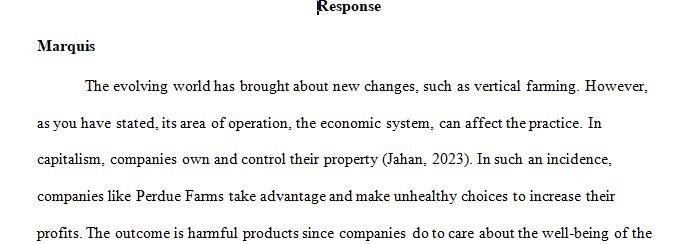Vertical farming is a new and innovative approach to agriculture that aims to provide sustainable and efficient food production.
Marquis’s comment to my discussion post:
Sonia,
Vertical farming is a new and innovative approach to agriculture that aims to provide sustainable and efficient food production. However, the economic system in which it operates can significantly impact the industry’s practices and outcomes. Capitalism and socialism are the two primary economic systems in vertical farming, each with unique characteristics that can affect the industry differently.
Capitalism, as an economic system, prioritizes profit maximization and self-interest. In this context, companies such as Perdue Farms adopt a capitalist approach to earn extra revenue by raising thousands of chickens in cramped environments without considering the animals’ well-being. This approach can have adverse effects, including using genetically modified products that increase animal growth, causing illness and mortality, and posing a risk to consumer safety.
In contrast, a socialist economic system involves government regulations to control private business operations. Regulations, such as those overseen by the USDA’s Animal Care Program and GMO guidelines, can provide guidelines for best industry practices and animal welfare. However, this approach can also have drawbacks, as companies can use natural resources as they see fit without considering the larger population’s suffering.
Overall, balancing profit and social responsibility in vertical farming is crucial. Regulations and industry standards should prioritize animal welfare, human health, and environmental sustainability to ensure a positive impact on the community. Companies should adopt sustainable and ethical farming practices, and consumers should be informed and encouraged to choose products that prioritize social and environmental responsibility. In this way, the benefits of vertical farming can be fully realized, and adverse effects minimized.
Response from Arhyns discussion post to my comment:
Hello Sonia,
Thank you for reading my post and providing your feedback. With the Perdue Farms, what I find to be extremely shocking and absurd is how big the Perdue Farms are to know and understand how important it is to produce food in clean environments especially since they are one of the biggest producers in the U.S. Since the importance of profit is a priority in this case due to the negligence of the treatment of these animals, it further provides more than enough to state that it is a capitalist organization as you mentioned. At what point does the farmers step aside and think of their own core values? Do you think it was even considered to make changes for the animals to be placed in cleaner environments before the lawsuit came about? I also agree that the ethical theory that best describes this case is deontology as it mentions, “Treat people as an end and never merely as a means to an end” (Fieser, 2015). At what point does Perdue Farms consider the health risks to consumers that are purchasing their products if it jeopardizes the growth of their farm?
Paper Format: APA
Answer preview to Vertical farming is a new and innovative approach to agriculture that aims to provide sustainable and efficient food production.

APA
321 words
Get instant access to the full solution from yourhomeworksolutions by clicking the purchase button below


